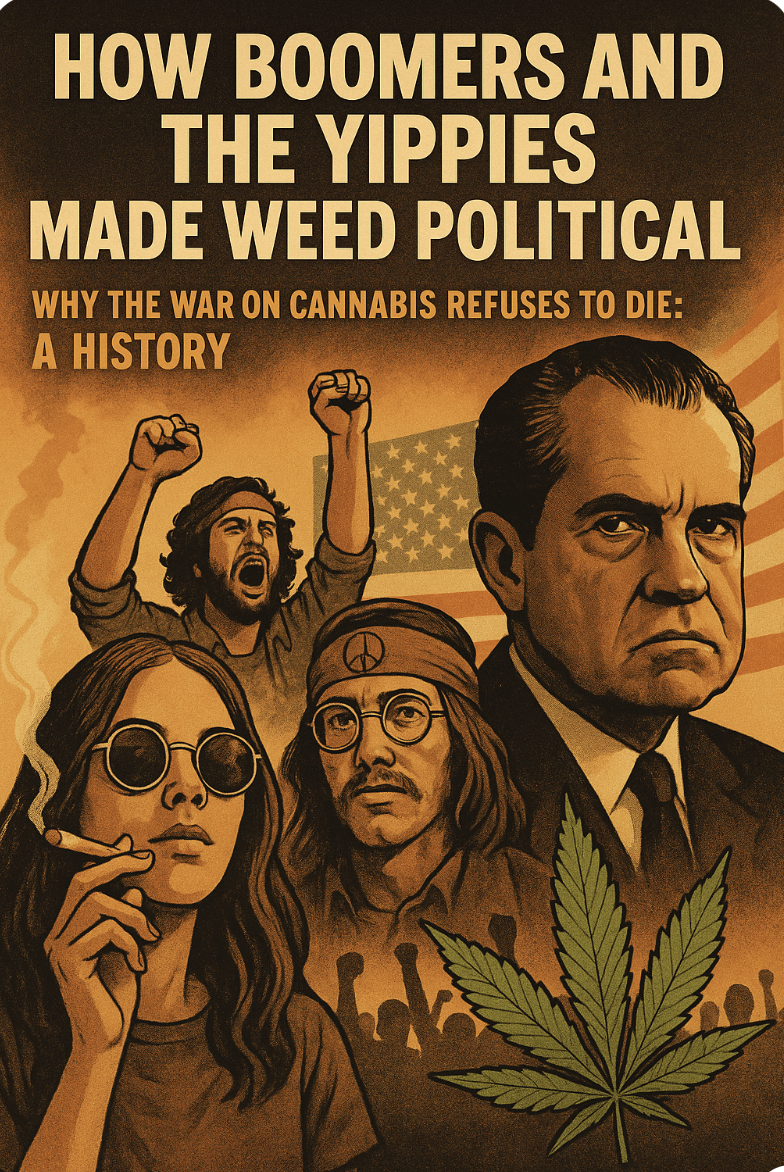Why the War on Cannabis Refuses to Die: How Boomers and the Yippies Made Weed Political

For much of the eighteenth and nineteenth centuries, American physicians freely prescribed cannabis to treat a wide range of ailments. But by the mid-twentieth century, federal officials were laying the groundwork for a sweeping criminal crackdown. Cannabis would ultimately be classified as a Schedule I substance, placed alongside heroin and LSD, and transformed into a political weapon that shaped American policy for the next six decades.
This seven-part series chronicles the milestones, backlash, and unintended consequences that have shaped the war on cannabis from the 1960s to the present day.

Part One: How Boomers and the Yippies Made Weed Political
By the late 1960s, cannabis use in the United States was exploding—both in scale and across social boundaries.
Baby boomers, coming of age during a time of war and cultural upheaval, embraced cannabis as a symbol of rebellion and freedom. Sociologists described this generation as the “growing edge” of American life: confident, affluent, and unafraid to challenge the postwar norms of authority, conformity, and restraint.
“Probably the most affluent, confident, indulged crop in human history,” said psychologist and counterculture icon Timothy Leary.
[This] generation of young Americans threw caution to the winds and recklessly rejected the fear-imposed systems that have kept human society surviving—the work ethic, male domination, lifestyle conformity, inhibition of sensuality and self-indulgence, reliance on authority.”
Cannabis arrests surged alongside the cultural shift. In California, possession arrests jumped from 7,560 in 1964 to over 50,000 by 1968. Nationally, federal cannabis seizures increased more than tenfold between 1969 and 1973; hashish seizures rose more than twentyfold.
As the decade wore on, cannabis became increasingly entangled with the politics of protest. Following the assassinations of Rev. Martin Luther King Jr. and Robert F. Kennedy, protests erupted at the 1968 Democratic National Convention in Chicago, bringing cannabis, civil disobedience, and youth resistance together in the national spotlight.
Enter the Yippies.
A self-styled band of anarchists, artists, and dropouts, the Youth International Party was led by Abbie Hoffman and Jerry Rubin, both veterans of the anti-war movement.
Hoffman and Rubin had come to believe that American politics and culture had devolved into a state of abject absurdity…The War in Vietnam was absurd. Consumerism and greed were absurd. The political rhetoric coming from both parties was absurd. And the only way to fight serious absurdity, Hoffman and Rubin decided, was with absurdity itself.”
In 1970, the Yippies organized the country’s first major “smoke-in” in Washington, D.C., drawing a crowd of 25,000.
Their street theater and radical tactics enraged President Richard Nixon, who was actively searching for a wedge issue to galvanize conservative voters and secure reelection.
On June 17, 1971, Nixon delivered a televised address declaring drug abuse “public enemy number one.” It was the beginning of the modern War on Drugs—and the moment cannabis became a national political target.
A Fire Still Burning
The crackdown Nixon launched still burns on, decades after a generation of rebels, protesters, and psychedelic thinkers struck the match.
 Cara Brown McCormick
Cara Brown McCormick





